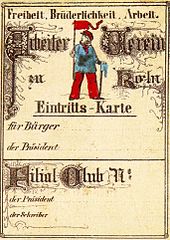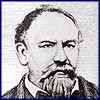Cologne workers' association
The Cologne Workers 'Association (KAV) was a workers' association founded in 1848 "for the purpose of enlightenment and education" of the workers in Cologne, which was initially oriented towards social reforms and later Marxist .
founding
Andreas Gottschalk , a Cologne doctor for the poor and one of the most important workers' leaders in the Lower Rhine region, presented the demands of the workers to the mayor as one of the leaders of a demonstration in front of the Cologne town hall on March 3, 1848. "His demands were those of a radical democracy [...] and the protection of work and security of human needs for everyone." It was also Gottschalk who suggested organizing the Cologne workforce in an association in order to be able to give more emphasis to one's own demands.
The founding meeting of this Cologne workers' association took place on April 13, 1848. Around 300 delegates elected Andreas Gottschalk as president and appointed further board members.
Fritz Anneke , a former Prussian artillery officer , became the first secretary . Anneke headed the most important progressive newspaper in Cologne alongside the Marx'sche Neue Rheinische Zeitung , the Neue Kölnische Zeitung , which was continued as a women's newspaper by his wife Mathilde Franziska Anneke while Fritz Anneke was imprisoned . The Frauenzeitung was the first regular magazine in Germany to campaign for women's rights. In the summer of 1849, the Annekes took part in the constitutional struggle and after the end of the revolution went to the USA , where they supported Lincoln and the Republican Party .
In addition to the board of directors, an association committee consisting of 31 people was set up, the members of which were not determined by election at the founding meeting, but by decision of the individual trades represented in the association . In addition to the elections to the board of the association, the statutes of the association were also adopted. This endowed the association's board with extensive competencies and sole representation rights. A general assembly could only be called by a majority of one trade or by at least 50 supporting members.
Political activity and club development
April 1848 to July 1848
Just ten days after the founding meeting, the Cologne workers ' association published its own newspaper , the newspaper of the Cologne workers' association , which was later renamed Freedom, Fraternity, Work . In it, the board formulated its demands for more participation in company decision-making processes, fair social security and the establishment of effective occupational health and safety laws. In addition to the club newspaper, the club also wrote numerous petitions to support the goal of noticeably improving the living conditions of the workers. In addition, the association articulated demands for the establishment of arbitration tribunals for equal participation in companies and decided to boycott what it believed to be unfair, because indirect, elections to the Frankfurt National Assembly. These demands and publications earned the association a lot of sympathy, so that the number of members rose to up to 7,000 people, according to various sources. At the congress of the German democratic republicans , which took place from June 14 to 17, 1848 in Frankfurt am Main, Andreas Gottschalk, as a delegate of the Cologne workers' association, was considered one of the most important people. However, he failed in the elections for the newly established Central Committee of the German Republicans. Influenced by this defeat, Gottschalk forced a merger with the Democratic Society (DG) around Karl Marx and Friedrich Engels on behalf of the KAV . However, this was rejected by the DG and so a joint committee was only set up to coordinate the Lower Rhine workers' associations. July 3, 1848 was to be a clear turning point for the Cologne workers' association. Because of the demands for an immediate establishment of a democratic republic, Andreas Gottschalk and Fritz Anneke were arrested and brought to justice. Jean Jansen , who was one of the founders of the association, became temporarily chairman. In the subsequent criminal proceedings, Gottschalk and Anneke were acquitted, but Gottschalk went into exile in Paris in December 1848 for fear of further repression and because of his poor health as a result of a cholera epidemic. The KAV had thus lost its president and spokesman. In the spring of 1849 Anneke was involved in the assault on the Zeughaus in Siegburg together with the Bonn law student and later US Interior Minister Carl Schurz . Then he went into the armed underground and commanded an artillery regiment of the Palatinate People's Army until the Rastatt fortress was besieged .
July 1848 to October 1848
Karl Marx and his colleagues from the Democratic Society used the forced departure from Andreas Gottschalk to gain more influence in the KAV. Shortly after Gottschalk's arrest, Joseph Moll became the new president of the KAV and Karl Schapper his new deputy. With this new management, the ideas of Marx's communists prevailed and there was a clear radicalization of the association's work. Due to this fact, among other things, the KAV showed great willingness to fight during the September riots in 1848 and took part in the erection of barricades and the preparation of an armed struggle in Cologne, which, however, never took place. As a result, Schapper was imprisoned and Moll fled to London.
October 1848 to October 1849

In order to avoid the collapse of the association, the members quickly tried to find a new, reputable chairman. In October 1848 a delegation from the KAV visited Karl Marx and offered him the chairmanship of the association. On October 22nd, Marx was appointed the new president by a general assembly of the association. While strictly observing the path to a communist revolution that he himself had designed, Karl Marx decided not to allow all Marxist-oriented clubs and associations, including the Cologne workers 'association , to participate in the alliances of the General German Workers' Brotherhood. He feared that this rather moderately acting alliance could oppose the will to overthrow the workforce. After a strictly Marxist reorientation of the association, Marx handed over the office of president again to Karl Schapper at the end of February 1849, who only held it for three months until his expulsion in May. The successor and thus the last president of the KAV was Peter Gerhard Roeser , like Schapper, Moll and Marx, also a member of the League of Communists . Despite the continued willingness to fight on the part of the members, criticism of the club's management arose in the course of 1849. More and more workers demanded a return to the interests of the working class and a turn away from communist ideas of overthrow. Following this request, the association's board decided to join the General German Workers' Brotherhood, which no longer took place due to the failure of the revolution.
End of the Cologne workers' association
Although there was no self-dissolution decision of the Cologne workers' association, the end of the association can be determined at the turn of the year 1849/1850. Due to new, restrictive and restorative legislation in Germany, the association changed into a workers' education association in October 1849 , before the resolution of this new association was decided in 1850.
swell
- Freedom, brotherhood, work. Organ of the workers' association . Responsible editor W. Prinz. Cologne No. 1 from October 26, 1848 to No. 20 from December 31, 1848. Publisher PG Roeser (Reprint Detlev Auvermann, Glashütten i. Ts. 1979)
- Freedom, brotherhood, work. Organ of the workers' association . Responsible editor Chr. Josef Esser. Cologne No. 1 from February 8, 1849 to No. 32 from June 24, 1849. Publisher Chr. Josef Esser (Reprint Detlev Auvermann, Glashütten i. Ts. 1979)
- Freedom, work . Responsible editor W. Prinz. Cologne No. 1 from January 14, 1849 to No. 33 from June 24, 1849 (Reprint Detlev Auvermann, Glashütten i. Ts. 1972)
literature
- Gerhard Becker: Joseph Moll. Member of the central authority of the League of Communists and President of the Cologne Workers' Association. In: Helmut Bleiber u. a. (Ed.): Men of the Revolution of 1848 Vol. 2 Berlin (East), 1987 ISBN 3-05-000285-9 , pp. 53–84
- Axel Kuhn: The German Labor Movement, (2004), Stuttgart: Reclam, ISBN 3-15-017042-7
- Werner Milert and Rudolf Tschirbs: From the workers' committees to the Works Constitution Act. History of corporate interest representation in Germany, (1991), Cologne: Bund-Verlag
- Peter Röben (2006): Historical development of corporate co-determination in Germany
- Walter Ulbricht: History of the German labor movement - Volume I - X, (1966), Berlin: Dietz Verlag
- Heitmann, Alexis: Workers on the Rhine and Elbe. Comparison of two centers of the early German labor movement. Hamburg and Cologne 1845-50. Munich: AVM, 2009. ISBN 978-3-89975-816-0
See also
Individual evidence
- ↑ Kuhn, Axel (2004): The German labor movement
- ↑ Kuhn, Axel (2004): The German labor movement
- ^ Petition of the Workers 1848, cited. n. Kuhn, Axel (2004): The German labor movement
- ^ Peter Röben (2006): Historical development of company co-determination in Germany
- ↑ Kuhn, Axel (2004): The German labor movement
- ↑ Walter Ulbricht (1966): History of the German Labor Movement - Volumes I - X
- ^ Peter Röben (2006): Historical development of company co-determination in Germany
- ↑ Walter Ulbricht (1966): History of the German Labor Movement - Volumes I - X
- ^ Peter Röben (2006): Historical development of company co-determination in Germany
- ↑ Gerhard Becker: Joseph Moll. Member of the central authority of the League of Communists and President of the Cologne Workers' Association
- ^ Peter Röben (2006): Historical development of company co-determination in Germany
- ^ Peter Röben (2006): Historical development of company co-determination in Germany



